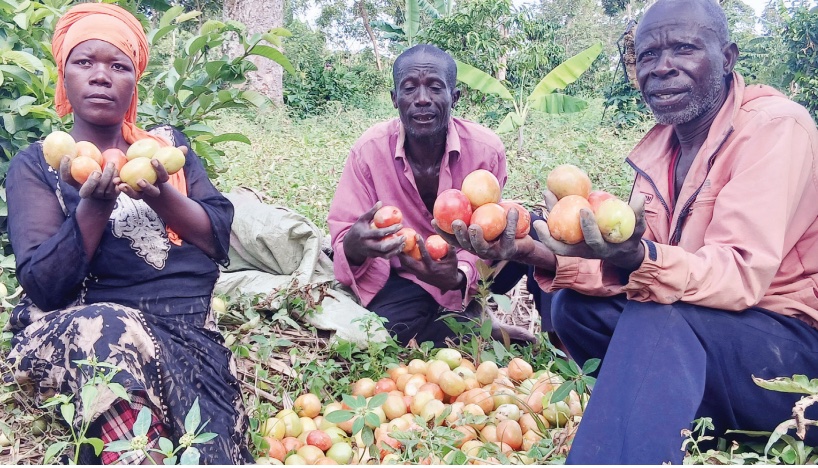
Screenshot
With the extreme climatic conditions of drought, floods and their devastating effects including hunger and increased levels of impoverishment, the Government of Uganda together with UK Export Finance, is extending support to farmers in less privileged communities in the Eastern Region to improve their livelihoods and boost household incomes.
With support from United Kingdom (UK) Export Finance, government embarked on establishing a solar-powered irrigation project to enable uninterrupted farming throughout the calendar year.
With over 20 projects already operating across districts such as Tororo, Bukedea, Katakwi, Kumi, Kaliro, Iganga and others, the schemes are transforming the agricultural sector, shifting farmers from traditional to modern farming practices.
Agule Irrigation Scheme is, however, setting the pace as the rest follow suit, given that it is among the first to be established in the region. Following the severe climatic conditions that resulted in the 2017 drought and the subsequent drying up of Lake Bisina in the Soroti sub-region, locals teamed up to pressure government for an irrigation scheme.
With limited water sources, the drying up of Lake Bisina left many farmers in a dire situation after losing animals, experiencing severe hunger, and becoming increasingly vulnerable. Initially, residents petitioned their leaders, who later sought President Yoweri Kaguta Museveni’s intervention in the wake of the region’s climatic challenges.
With support from UK Export Finance, government embarked on establishing a €218,661 solar-powered irrigation project in Agule Village. Dubbed the Agule Solar-Powered Irrigation Scheme in Toroma Sub- county, Katakwi District, the project has turned into a gem, transforming lives in the community.
Commissioned by Vice President Jessica Alupo in March 2024, the scheme comprises 36 solar panels of 470 watts each and a pump supplying 160 cubic liters of water per day to facilitate irrigation on the 12-acre farm. Several farmers have become role models in the community, illuminating the benefits of sustainable agriculture.
Some have purchased land, built residential homes, and enrolled their children in better schools. According to farmers, irrigation is now a game- changer in the Eastern Region. At the farm, according to project engineer Yusuf Mutebi, they conduct scheduled irrigation of two blocks at 20 minutes each.
To maintain continuity of the project, farmers are charged Shs 25,000 per block per season and Shs 30,000 for maintenance of the irrigation system every season. At least 48 farmers including 23 men and 25 women are farming on the 12-acre scheme, growing onions, tomatoes, sukuma wiki, and other vegetables.
Upon commissioning, the scheme yielded Shs 19 million in 2024, Shs 30 millionin the second season and Shs 25 million in the first season of 2025, with additional produce in storage awaiting market.
According to Stephen Alinga, the chairperson of Agule Farmers Management Committee in Toroma sub-county, Katakwi District, the farm has increased farmers’ incomes to the extent that they can now afford school fees, healthcare, and even build houses within two years.
“This project came at the right time. We no longer struggle with sauce as we did in the past, because we have tomatoes and other vegetables that have improved our diet,” he said.
Alinga added that some parents have managed to take their children to boarding schools; however, they still face challenges in accessing markets due to impassable roads.
“We face a challenge of storage, and we pray that government addresses it because our goods are perishable and cannot stay on shelves for long. They can be damaged by rats, lose value like onions, or simply rot away,” he said.
Julius Akol, a farmer at the scheme, said he grows tomatoes and onions. In the first season, he harvested onions whose sales motivated him to continue farming at the project.
“I grew onions in the first season and earned Shs 4 million after sales. I bought two oxen that now generate income through ploughing people’s gardens,” he said.
Akol’s lifestyle has since transformed. His children now attend boarding schools, and he is preparing beds for fruit trees to boost his income. The joyous farmer, with high hopes, aims to raise Shs 10 million to start a business in Katakwi Town to lift his family out of poverty.
Akol says he sometimes incurs losses, especially with onions that lose weight when stored for too long. Despite high yields, farmers decry market fluctuations and the lack of storage facilities for their produce.
“We applaud government for the initiative, but we still have a challenge of poor road networks within the community, which hinders access to markets in Soroti and Katakwi where we normally sell our produce,” Alinga said.
Currently, farmers have close to three tonnes of onions in storage; however, they cannot take them to market due to the poor state of the roads, giving middlemen the opportunity to exploit them.
They called for government intervention in establishing storage facilities, such as coolers, to preserve the perishables they produce. “We have a challenge of poor storage facilities. Tomatoes can be damaged by rats, while others get rotten,” Alinga said.
geofreyserugo1992@gmail.com



